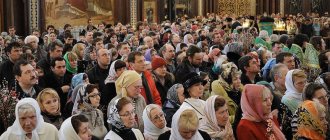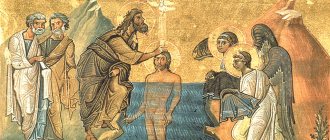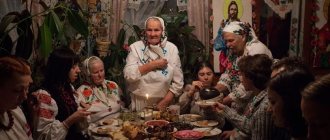What do Orthodox Christians struggle with all their lives? With sins - from small everyday ones to the most terrible ones. What sins are mortal and whether God will forgive us all sins - we tell you in this article.
Imagine: you have just crossed the threshold of Orthodoxy - and immediately find yourself at a crossroads. In front of you, as in a Russian fairy tale, is a stone. On that stone there is an inscription: “If you go to the right, you will sin, if you go to the left, you will sin, if you go straight, you will sin.” It's a strange place. But you can’t turn back either – that’s a sin.
This is how a man lived, lived, and he had no sins - he didn’t kill anyone, he didn’t even rob. I thought to myself that God was kind and would forgive everything. And then it turned out that there was sin all around. That there are also different kinds of these sins, and perhaps not all of them will be forgiven us. Let's help the person figure out what he is accused of here?
Deadly sins in Orthodoxy
What are you accusing me of?
The word “sin” appears 497 times in the Bible. Almost on every page. That's why it's so important to know what it really is. The Sixth Ecumenical Council (680–681) defines this concept for us as “sickness of the soul.” And if God created man as similar to Himself, then sin is what separates us from God. This is a wound that a person inflicts on himself. Damage after which “the way it was” will no longer be. This can be not only an action, but even a thought.
Holy Scripture tells us that sin is the breaking of the law, “iniquity” (1 John 3:4). The Fall was committed by Adam and Eve when they disobeyed, transgressed the law of their Heavenly Father and were expelled from Paradise as punishment. “The wages of sin is death” (Rom. 6:23). Since then, this damage has become part of human nature and has become inseparable from it. We are already born in sin (original). This is the very falling away from God, which entailed suffering, aging and death. In this state, our forefathers could no longer eat the fruits of the tree of life, just as we cannot now be admitted to Communion with an unclean soul. This is why it is so important for us to separate ourselves from sin in order to find our way home again.
mortal sins in Orthodoxy
Are all sins the same?
Every offense has a gravity. If a child breaks his mother's vase, this is not good. But if, moreover, he blamed it on someone else, that’s even worse. Not all sins are the same - there are voluntary and involuntary sins. Of course, a mistake made out of ignorance is not the same as one that you are, as it were, “preparing” to make, you know that it is bad, but you do it anyway. “The servant who knew the will of his master and was not ready, and did not do according to his will, will be beaten much, but he who did not know, and did something worthy of punishment, will be beaten less” (Luke 12:47-48).
There are sins leading to death and not to the death of the soul - how to understand this? The soul dies the more, the further it is from its Creator, therefore mortal sins include conscious falling away from the faith, from one’s neighbor, denial of God and struggle with Him, and dislike for people. “He who does not love his brother remains in death” (1 John 3:14).
mortal sins in Orthodoxy
Sin against the Holy Spirit is terrible and mortal. He doesn't say goodbye. “Therefore I say to you, every sin and blasphemy will be forgiven men, but the blasphemy against the Spirit will not be forgiven men; if anyone speaks a word against the Son of Man, it will be forgiven him; But if anyone speaks against the Holy Spirit, it will not be forgiven him, either in this age or in the next” (Matthew 12:31-32). Christ himself says that there are mistakes that lead the soul to destruction.
But even if we do not commit sins leading to death, our transgression always hurts someone. Therefore, they also share offenses against God, against one’s neighbor and against oneself.
mortal sins in Orthodoxy
What are the mortal sins?
In the works of St. Ignatius Brianchaninov there is a detailed listing of human passions with instructions on how to get rid of them.
Sins that lead to death are called:
- Pride. This is a sin that forces you to love yourself more than other people. A proud person exalts himself above others and considers himself better than everyone else. The proud do not tolerate reproach, criticism, or humiliation. These include: nailing the mind and heart to earthly things, reading heretical books, infatuation with heresy, stupidity of mind, unbelief, blasphemy, ridicule, disobedience to authorities, abandonment of silence and humility, loss of simplicity, ignorance, godlessness and, ultimately, death of the soul. Vanity is a type of pride that makes a person admire and admire his appearance and abilities. A vain person does not understand that this is not his merit, but a gift from God. As a result of vanity, a person exalts himself above everyone and humiliates others.
- Love of money. The desire for wealth, the love of money, profit. The love of money does not allow a person to give alms; a lover of money regrets giving even a penny to the poor. Caring about wealth does not allow a person to live peacefully, think about spiritual things, or pray. This also includes the fear of becoming poor, getting sick, growing old, being expelled, lack of trust in God’s Providence, excessive love for earthly things, and the desire to appropriate someone else’s things for oneself.
- Fornication. This is sexual activity before marriage. A variety is adultery, adultery of spouses. This passion includes lust, indecent thoughts, glances, prodigal dreams, daydreams, and memories. Christ called an adulterer someone who even looked at the opposite sex with lust. Those who watch indecent images and films, read depraved books, and linger in lustful thoughts are also guilty of this. This includes unnatural sins, masturbation, bestiality, incest, etc.
- Envy. The desire to have a neighbor's wife, livestock, or something from another person's property, contrary to the tenth commandment given by God to Moses. You can also be envious of health, well-being, work, wealth, talents, pastime, etc. Envy can lead a person to cause harm to his neighbor.
- Gluttony. This includes not only overeating, but also secret eating, delicacy, gourmetism, breaking fasts, drunkenness, preference for bodily peace, and pride.
- Dejection , sadness about earthly things, idleness, relaxation of the soul, decrepitude of the mind, carelessness about the soul, relaxation, abandonment of prayer , beneficial reading, needlework, absent-mindedness, inattentive prayer, long non-attendance to church services, being late for the service and leaving before the end, bliss, too much sleep, laziness.
- Anger, hot temper, resentment of one's neighbor , pushing, hitting, slander, desire for revenge, malice, argument, shouting, harsh and caustic words, rancor.
It is clear that everyone can find one or another passion that leads to mortal sin. The task of an Orthodox person is to identify and try to fight it all his life, so that at the end of his life he can appear before the Lord pure and holy. God, who does not want the death of sinners, will, of course, always help a repentant person to reform. But first you need to understand yourself and realize which passion dominates in a given person. After all, knowledge is the beginning of correction.
Sins of “different levels”
Rarely does a person immediately “fall” into conscious mortal sin. But even unconscious, it will always be the result of a whole system of “harmless” and “easy” steps. Something that doesn’t even seem like a mistake to us. Orthodox asceticism tells us about a whole system of development of sin: from the birth of a thought (preposition) to its putting into action. And then, if sin becomes a habit, catching a couple more with it, it already develops into passion. Passion, in turn, is “a strong desire for something forbidden,” that is, the desire to commit a sin (Complete Church Slavonic Dictionary). It's a vicious circle.
mortal sins in Orthodoxy
Running in this circle, a person unnoticed by himself becomes captive of many sins, including serious ones, which damage the soul irrevocably. And our soul becomes like a broken old cup: even if you glue it back together, the crack will still be visible. And water will pour out of it. It’s difficult to retain grace in such a soul.
Therefore, do not underestimate the enemy. You need to be attentive even to insidious thoughts, because breaking a vicious circle is much more difficult than not entering it. “Whoever commits sin is a slave of sin” (John 8:34). And in such a state, only one doctor can help - the Savior: “For without Me you can do nothing” (John 15:1).
mortal sins in Orthodoxy
About the departed
Prayer for the departed
Rest in peace, Lord, the souls of your departed servants: my parents, relatives, benefactors (their names), and all Orthodox Christians (bow), and forgive them all sins, voluntary and involuntary, and grant them the Kingdom of Heaven It's sweet.
If you can, read the Memorial instead of short prayers for the living and the departed.
Memorial for the deceased
Remember, Lord, from this life the most holy patriarchs, the most holy metropolitans, archbishops and bishops of the Orthodox, who departed from this life, in the priesthood and in the clergy and monastics who did not serve You, and will rest in Your eternal villages with the saints. (Bow)
Remember, Lord, the souls of Your departed servants, my parents (their names), and all relatives according to the flesh; and forgive them all their sins, voluntary and involuntary, giving them the Kingdom and the communion of Your eternal good things and Your endless and blissful life of pleasure. (Bow)
Remember, Lord, and all in the hope of resurrection and eternal life, our departed fathers and brothers and sisters, and those who lie here and everywhere, Orthodox Christians, and with Thy saints, where the light of Thy countenance shines upon us, O Lord, and have mercy on us, for He is Good and Lover of Humanity. Ah min. (Bow)
Grant, Lord, forgiveness of sins to all those who have gone before in the faith and hope of the resurrection, our fathers, brothers and sisters, and create for them an eternal memory. (Thrice)
>Orthodox prayers ☦
“And the one who comes to Me I will never cast out”
But here an obstacle arises - fear. What if they don’t forgive me? Will I find the strength to improve? Or maybe there is no salvation for me and I don’t need to go anywhere anymore? Maybe it's time to fold your paws and go to the bottom? But you and I remember that in that same fairy tale there were two frogs. And only we can choose which one we want to be. Christ healed “all infirmities among people” (Matthew 4:23), not only physical, but also spiritual. Remember that feeling of power that occurs after Communion, not destructive, but creative, setting the vector in the right direction - for struggle, for healing.
And how easy it is for us after confession. After all, the Savior himself says: “And the one who comes to me I will in no way cast out” (John 6:37). He says this about everyone, without exceptions and reservations, “but if ... then no.” This applies to both voluntary and involuntary sins: regardless of their severity, in the secret of confession the Lord forgives us everything. With only one condition - if we repent. As the holy fathers teach us: “there is no unforgiven sin except unrepentant sin.” This is why suicide is such a terrible offense: after it, repentance is no longer possible.
mortal sins in Orthodoxy
But not all bridges have been burned here either. We see in biblical history that, even after making the most difficult mistakes, betraying Christ, Judas hanged himself. But why? He realized what he had done and was afraid. Judas Iscariot repented and tried to correct what he had done: he went to return the money to the high priests. And even for him forgiveness was possible. This idea is very interestingly revealed by the modern author Daria Sivashenkova in her book “Behold Judas, Betraying Me.” The idea that the Lord always stands at the door and waits for it to be opened to Him.
And so, only having crossed the threshold of Orthodoxy, we fall into the ocean of thoughts. Sin, as we see, can be discussed for centuries. One thing is clear - the ways of the Lord are mysterious. As a navigator, He paves the way for us to the Kingdom of Heaven. And sometimes the route has to be rebuilt: bumps and bumps, falling on the sidelines of life. But there is always hope to get out, and Easter is inevitable. After all, the Lord is ready to forgive even the father of lies himself if he says: “forgive and have mercy.” But he doesn’t want to say it...
AUTHOR: Anastasia Kurkova
Illustrations : Maria Tyurina
About voluntary and involuntary sins
(End. See beginning: The Power of Forgiveness)
We pray to God to forgive us every sin, voluntary and involuntary.
Now you will say, as the ancient Greeks said:
- No one commits sins of their own free will.
Indeed, our soul does not want to sin, because it was created by God, created in the image of God and does not want sin. But after the Fall, all these gifts given to us by God were separated and our soul became mixed with passions. And often, saying in my mind: “I don’t want to sin!” – we see that our heart is carried away by sin and our entire being is captured. So, that means I still said: “I want to sin”? I want it, I don’t want it, but I commit a sin! Maybe I don’t want to, but apparently I do want to, since I’m doing it so quickly.
Therefore, voluntary and involuntary sin means those circumstances that we understand and those that we do not understand, because there are many things that we do without understanding that they harm our soul.
Maybe we also have bad habits, such as the habit of ironizing and mocking others, which is very bad and is a product of our egoism, the fruit of a number of our complexes and indicates our aggressive mood towards another person. After all, it’s one thing to make a joke, although it’s dangerous, but irony is something completely terrible. To sneer at others and treat them this way is a consequence of self-praise and selfishness. We often make fun of others and do not understand that in this way we harm our own soul.
Even spiritual people who strive can exhibit traits that are unprofitable for them, either because they have not yet localized[1] them, or because God allows them to have some natural shortcomings so that they humble themselves and do not think, as if they were infallible and perfect. After all, even the greatest, most perfect person is imperfect before God.
We all have things in our minds that we may not have localized. And those who condemn and accuse us help us do this. In this sense, they are our great benefactors, the only ones who will tell us straight to our faces:
“You laugh at others, but you yourself are such and such.”
Those who love us, our friends, will never say this, they only tell us good things. And the one who doesn’t like you, who can’t stand you, will open his mouth and tell you words that will upset you. But these words are extremely useful, because they show us that there is much in our character that we do not perceive. Maybe it seems to us something innocent, and we don’t even suspect that it can hurt our brother, but, nevertheless, it hurts him and causes a terrible state in his soul, which unbalances him, and in you and there was no idea about it.
We sometimes don’t even suspect that our words and actions can hurt our neighbor, but they really torment him
And as I said another time, Satan is doing a very subtle job here. That is, when a person believes that another, his brother, has a grudge against him, that the other does not even want to see him, turns away from him or is jealous of him, then Satan makes sure that all his thoughts are confirmed, while the other’s thoughts there was no talk about it. But, nevertheless, he actually does something that confirms the suspicions of the first. I'll give you an example from my life.
One brother believed that I did not want him near me. One night I saw him in the temple and he was very upset:
- What happened to you?
“I can’t take it anymore, I’m tired, you keep turning away from me, you don’t show me respect.”
I really seemed to have fallen from heaven to earth: I had no idea about it, didn’t even think about it.
- But how come you had no idea? - and gave a dozen examples, and all ten turned out to be genuine!
But everything was not as it seemed to him. I did all this simply because I didn’t think, or it just happened that way.
He gave me one example:
“Yesterday you spoke with your fathers and, as soon as I arrived, you immediately fell silent and left.”
Indeed, it was so. I talked to some fathers, we chatted, laughed, and I was looking for a reason to leave. So as soon as this brother came, I thought it was a good opportunity. And left. Yes, but what about the brother who interpreted everything in his own way?
There was another case. We went together to the same monastery. The hotelier asked me:
- How many people are with you?
I answered:
- Three.
I meant that there are three of them and I am the fourth. And the hotelier thought that there were only three of us, and my brother was left alone, without us.
He said:
– We went to the Dionysiates monastery, the hotelier asked you: “How many of you?” - and you answered him: “Three,” - and there were four of us. And you took three fathers with you, and they left me alone on the street.
Indeed, the three of us were put in one room with three beds, and he was put in another.
“Then I told you that I was going to go fishing, and you said: “No, don’t go now, you’ll go another time.” And he went.
Indeed, it was so. Because he was dizzy then, and there was a storm, and so that nothing would happen to him, I told him:
- It’s okay, father, you’ll go another time!
And he didn’t say that there was a storm now, because he saw it himself. And I went because I didn’t feel dizzy. But he turned out to be guilty.
That is, it was a whole string of similar cases, and all of them were true, but at the same time false.
I know one person who came to me to confess and left shocked, saying:
– I went to confess, and he mocked me!
This was passed on to me.
- Did I make fun of him?
- Yes.
- Well, okay.
And how did I mock him? I had a bad habit - I don't know if I still do it, but sometimes when I'm confused, I don't know what's happening to me, but I smile. He said:
“I name my sins, and he laughs and mocks me.”
Another lady came and said that because of me she became a Jehovah’s Witness. Because of me? Because of me. Why?
“I came three times to meet you, but I didn’t find you!”
Okay, well, did I know you were coming? I’m not standing on the threshold of the metropolis waiting for someone to come to meet him. Call me on the phone, tell me you'll come!
The mass of everything else.
“He saw us, but didn’t talk to us.”
Indeed, recently there was one event, and I was very tired, looked gloomy, sullen.
- Look at him! As soon as he saw us, he immediately frowned! I was just talking and laughing! And when he saw us, he immediately became gloomy.
Indeed, then I saw the photograph that was taken then, and I had such a face that I thought: what kind of face is this! But then I was so exhausted, it was hot, I was thinking about all sorts of problems, and my face was really gloomy. But not because I saw these people, but because I was thinking about problems. But the man doesn’t know this and says:
- You see? As soon as he met me, he immediately frowned. And when so-and-so came, you immediately smiled at him, because he is your friend, you love him, because... - a lot of things!
Therefore, no matter how funny it may look, we, voluntarily or unwittingly, commit sins with which we hurt our brother. And we have even more sins, with which we hurt our souls and damage our connection with God - our Father.
Questions for Metropolitan Athanasius
– You said that we can sin and not suspect it. How can this be detected? Maybe the confessor will tell us about this?
- If he feels it, he will say it.
– What if he doesn’t feel it?
– If she doesn’t feel it, then your neighbor will tell you about it, don’t worry! A neighbor, colleague, spouse, girlfriend, friends will say. Those who are close to us will tell us about this. At some point they will tell us this: “I can’t stand you anymore! You are a difficult person, always dissatisfied with something, greetings.”
Would you say they say this out of spite? Okay, I’m not saying it’s out of love, but when they tell us everything they say, we have to look: isn’t it true? Isn't that the impression I give? Maybe I don’t have anything like that in my heart, but, as I said, it’s one thing what my heart says, and another thing what my face says. A person sees my face, not my heart; he is not a heart expert to read my heart. Maybe my heart is beautiful, like the Garden of Eden, I have great love for a person and do not wish anything bad for him, but my facial expression will be disgusting. And you say to yourself: “Eh, my child, come on, change that expression! What kind of face is this!”
Maybe your heart is beautiful, but your face is sour, and others see your face, not your heart. So change your face!
Our blessedly deceased elder, when he saw someone with such a face, said:
- Well, what kind of face is this, huh? Change your face!
After all, the other does not see our heart, let us remember this.
Many people say:
- Yes, nothing wrong with me, it’s just for a minute, it will pass for me.
Yes, for a minute - and it will pass for you, but for another it doesn’t work out for a minute when you kill him with your words. Now try to sit down and convince him that it was just for a minute.
If we are judged incorrectly, it is to our benefit. Think about it: what if he’s right?
- But what did I tell him? Just a word.
And this word was enough to hurt another person. Your tone, facial expression, words, movements, a lot of everything can still kill another person. Therefore, those who condemn us help us, even though they do not benefit themselves. At least I get a lot of benefit from those who criticize me.
If we are judged incorrectly, it’s okay. Some good will come out of this, because the other one is not a complete madman, he saw something. Therefore, I think that such people always help us. Look, even if someone judges us wrongly, then at least you understand that he is wrong: “Come on, let him tell himself, this is not so! But if he has such an idea about me, then it’s my fault!”











